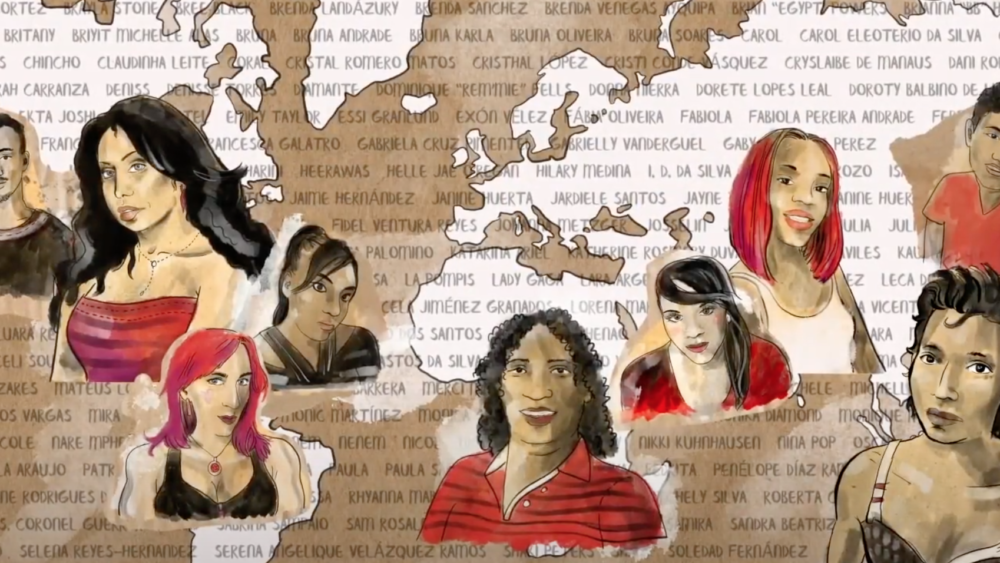DiEM25’s Taskforce on Feminism, Diversity and Disabilities’ statement commemorating the victims of anti-trans violence.
Warning: descriptions of violence.
A huge and multiyear effort goes into compiling the numbers of the deaths of trans bodies the world over. To date, since data has started to be gathered and compiled in 2008, there have been 3664 murders of trans and gender divergent people. In 2020 alone, 350 transgender people have been killed. These figures are obviously a misrepresentation of the real numbers, but they are an insight into a reality that claims victims daily. A vast majority of those killed were trans women or trans femmes: 98% to be precise.
If you care to log on to the website collating the data, you can find names like Pedrita, Brighit Miron, La Pompis, as well as dates, places, and a brief description of the violent act: “The victim was found with her hands and feet tied with a telephone wire” or “She was found with stab wounds and her face covered with a towel to muffle the screams.”
What is interesting about the language of the descriptions of the acts of murder is an almost complete lack of reference to the murderers. They are not relevant, or sometimes are referred to as “three men” or “a man in a white car”, but mostly they remain anonymous. A comprehensive list of names and descriptions of the assassins is impossible to find. Is that a coincidence?
In these places of violence we need to ask who and why?
Looking at what is missing in any context when understanding a situation with a critical eye is always revelatory. The answer to this question seems to escape the narrative, which is focused on the victims and their demeaning and humiliating deaths. These are not clean deaths, if there ever is one. These are brutal and violent killings, and that too is revelatory of the societies and politics we live in.
So who does the killing? Who plunges the knife repeatedly into the trans body? Whose hands strangle the neck of the trans woman denying her not only her breath but her voice, silencing her verb? Whose hands hold the guns, pull the trigger, cast the stones, dismember the body, beat, torture and burn? And what for, to what end?
Trans bodies are places of crisis, in constant movement towards something new, while political and gender regimes remain unchanged.
Trans bodies occupy spaces and places of rupture, of migration from one gender to another, putting into question one set of narratives to imagine different horizons of possibilities. But most importantly, trans bodies represent a rupture in the masculine universe.
The binary identity on which male supremacy is built is placed in an immediate and absolute position of questioning between what is affirmed and decided and what could be, but has no standing. The trans body is a place of political possibilities and epistemic paradox. They are places of crisis, in constant movement towards something new, while political and gender regimes remain unchanged.
By stepping out from one gender, the trans body reveals its performativity and becomes an exile of patriarchy. The trans body assumes the migratory nature of a body searching for safety, for recognition, for new belongings — dreaming of possibilities yet to be defined. The vulnerable nature of trans bodies is defined precisely by this place of non-belonging, of not having a sovereign nation they can swear allegiance to, lacking legal, cultural and affective belonging.
It is not a coincidence that half of all trans victims in the EU are also migrants for they share, in the end, the same status.
Refugees from one place of fragile certainties (a locus of such violence that it forces the subject to abandon it in favour of exile) to occupy a place of vulnerability and non-belonging, a non-place: transition as status. This place of social vulnerability inhabited by trans women and men represents a kind of coming together, an overlapping of identities, a transectionality of vulnerabilities. This leads to important questions related to race, precariousness of living conditions and legal status, illegality of sex work, discrimination in the workplace, misogyny, police violence and access to health care.
Before the recent migrations from Africa and the Middle East, trans-women escaped violence, poverty and discrimination in a steady flow from the Americas towards European cities such as Barcelona, Paris, Milan looking for financial security and social inclusion. These migratory flows question the rules of colonial patriarchy and the fictions of masculine supremacy. Within these flows, bodies inhabit a place of suspended politics, where ownership of the body is in flux and uncertain.
Trans bodies and migrant bodies come at the feet of the palaces of the colonizers to ask to be recognized, seen, and acknowledged. At the same time, they bear witness, in and on their bodies, to the colonial and patriarchal violence with which they were historically excluded.
Today, we come to listen to the silent witnesses — the Jennifers, Selenas, Ajitas — whose voices have been strangled and whose bodies have been lain, bleeding at the altar of patriarchy.
Their bodies tell us of the crises of the state, of citizenship, of structures, of truths and certainties.
The very idea of the nation state is bursting at the seams with the bodies of trans women and of migrant populations, attesting with their precarious existence to the violence of the narratives of race, sex and gender.
On this day of remembrance, we in the Feminism, Diversity, and Disabilities task force, commemorate and mourn trans people who have been murdered and are victims of systemic forms of anti-trans violence.
Video Source: TGEU website for the Trans Day of Remembrance 2020.
Do you want to be informed of DiEM25's actions? Sign up here










